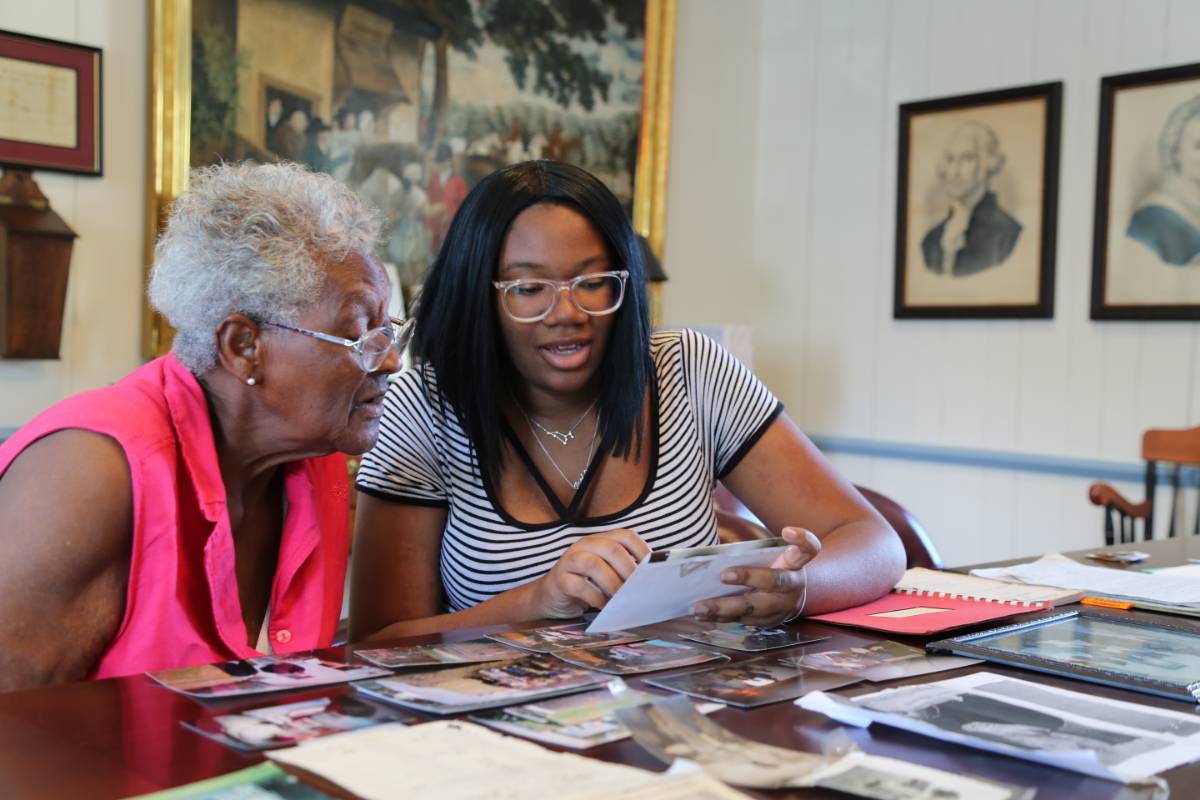Big Grant for Chesapeake Heartland Project
Mellon Foundation Grants $800K to Washington College for Chesapeake Heartland Project

CHESTERTOWN, MD—Washington College’s new community history initiative, Chesapeake Heartland: An African American Humanities Project, is gaining rapid momentum with the announcement of an $800,000 grant from The Andrew W. Mellon Foundation, an $89,000 grant from the State of Maryland, and a $100,000 gift from a private foundation.
Developed at Washington College’s Starr Center for the Study of the American Experience, and with a broad array of community partners, Chesapeake Heartland will launch a three-year initiative to digitize, share, and curate more than three centuries of African American history while developing a new model of public history that can eventually serve other communities around the Chesapeake region and beyond. This innovative project also collaborates with the Smithsonian National Museum of African American History and Culture (NMAAHC), whose Community Curation Project will travel to Kent County, Maryland, in 2020 and give county residents unprecedented resources to preserve their history, ranging from family photographs and letters to recordings of oral histories and musical performances.
“Chesapeake Heartland will take the study of history beyond the textbook and the classroom and enable us to rewrite history together,” says Patrick Nugent, the Starr Center’s deputy director, who serves as project director. “Kent County is full of exceptional individuals, organizations, and communities that care deeply about the past as well as the present, and we invite everyone to bring Kent County’s African American history to life, celebrating its role in the American story more fully, and turning toward the future proud and united.”
The Starr Center’s primary local partners are Sumner Hall, the Kent County Arts Council, and the Kent County Public Library. Through these groups and others, the project will also engage and support smaller nonprofits, schools, faith communities, mentor groups, artists, writers, Washington College faculty and students, and local citizens. Individuals and groups will be able to apply for direct grants drawing on the Mellon funds.
A supplemental grant of $100,000 from a private family foundation will specifically fund involvement for Kent County secondary-school students and teachers. And the Maryland Heritage Areas Authority granted $89,000 for a “Chesapeake Heartland African American Humanities Truck” that will serve the county as a mobile oral-history studio, digitization station, and flexible exhibition space.
Chesapeake Heartland is built around the concept of the Chesapeake region as a heartland of African American history and culture, going back to the arrival of the first Africans near Jamestown in 1619 and stretching through the March on Washington and beyond. Kent County, in the heart of Maryland’s Eastern Shore, is in turn a microcosm of that history. African Americans arrived in Kent County in the mid-1600s, and their descendants fought for freedom in the American Revolution and Civil War, played leading roles in the abolitionist movement and the Underground Railroad, marched in the 1960s Civil Rights era protests, and carried rich artistic and cultural traditions through the generations.
“We are really pleased to contribute to the preservation of local history and culture through the Community Curation Project in 2020 and learn right along with the citizens of Kent County,” says William Pretzer, senior curator of history at the NMAAHC. Through its Robert Frederick Smith Fund for the Digital Preservation and Curation of African American History, NMAAHC’s Community Curation program will host public lectures, genealogy workshops, and digitization events in Kent County.
“The genesis of Chesapeake Heartland goes back to three visits that NMAAHC founding director Lonnie Bunch and senior curator Bill Pretzer made over the past several years,” says Starr Center Hodson Trust-Griswold Director Adam Goodheart. “They were impressed not just by the depth and richness of Kent County’s African American heritage, but also by the vibrancy of our community, the diversity and dynamism of our nonprofit organizations, schools, public entities, and faith groups, and the strength and broad vision of those groups’ leadership.”
Under Starr Center supervision, a diverse team of Washington College students has been working for the past 16 months to launch Chesapeake Heartland, interning at the NMAAHC, conducting oral histories, transcribing and digitizing courthouse records, and assessing archival collections near and far. They have also met with dozens of local leaders to learn how the project can best serve community needs, identifying a range of goals for Chesapeake Heartland including providing paid work opportunities for local youth, supporting local schools, fostering cross-generational dialogue, building the capacity of local nonprofits, strengthening relationships with Washington College, and bridging persistent ethnic and socioeconomic divides.
“Chesapeake Heartland offers a rare opportunity to increase knowledge and pride in our local African American history, to learn appreciation and respect for ethnic and cultural difference, and to engage younger generations in cooperative community-unity work,” says the Rev. Robert N. Brown, Jr., of Bethel AME Church in Chestertown, a community liaison helping to steer the project.
Sumner Hall President Larry Wilson said the project “will energize efforts to document the contributions of local African American veterans by involving more community members in developing meaningful programs and exhibits.” Jackie Adams, executive director of the Kent County Public Library, says the partnership’s mission to “create and provide access to digitized local history materials will allow Kent County Public Library to overcome the constraints that would generally put such a project out of reach for a small public library.”
And Kent County Arts Council Director John Schratwieser says the partnership “will allow the KCAC to animate local stories of Kent County’s African American history and culture in exciting new ways. The Mellon Foundation grant will help to create a new path toward cultural equity that can be modeled again and again across this country.”